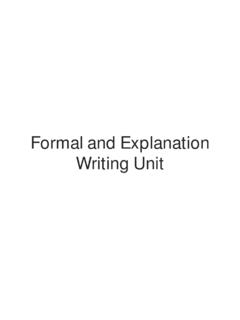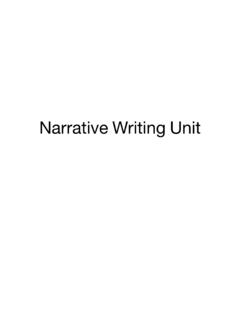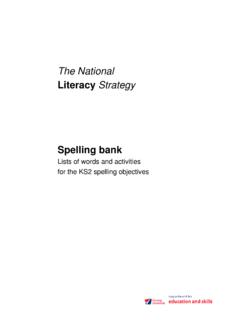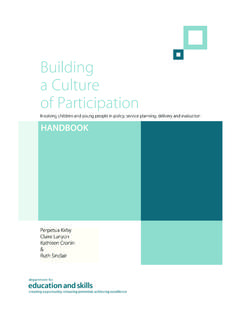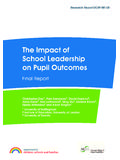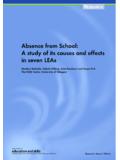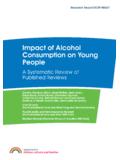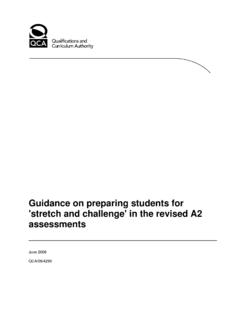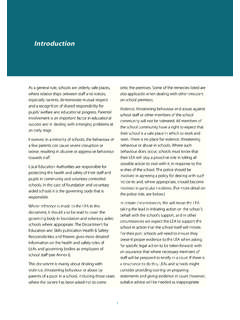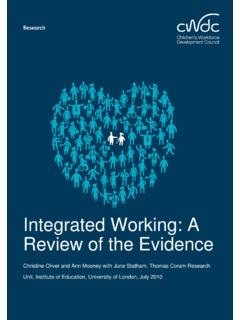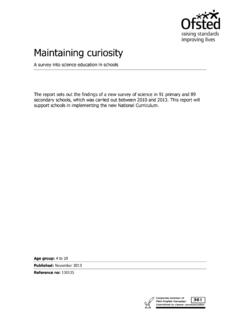Transcription of Independent Review of Mathematics Teaching in Early Years ...
1 Independent Review of Mathematics Teaching in Early Years Settings and primary SchoolsFinal Report Sir Peter WilliamsJune 2008iLetter to Secretary of StateChapter 1 Executive summary2 Chapter 2 The teacher Initial Teacher Training and continuing professional development6 Chapter 3 The Early Years 32 Chapter 4 Under-attainment and intervention Every Child Counts 42 Chapter 5 Curriculum and pedagogy 60 Chapter 6 Parents and families 69 Appendix 1 Appendix 474 83 Contents1 Dear Secretary of StateI am pleased to attach the Final Report of the Review of Mathematics Teaching in Early Years Settings and primary Schools, which you asked me to undertake in July 2007.
2 The Final Report follows from and develops the thinking contained in the Interim Report (published in March of this year).The Review has reached its conclusions on the basis of evidence which includes robust published research; relevant data and statistics; and a programme of visits to schools and settings throughout England. In addition, we have undertaken an extensive consultation with teachers and practitioners, trainers, providers of resources and policy makers. Of particular value has been a series of meetings and events during the consultation phase following the publication of the Interim Review has found much from which to draw encouragement, especially during its programme of visits.
3 I am most grateful for the warm reception we received in schools and settings. These visits helped crystallize our views on the issues confronting the Teaching of Mathematics to young high standards achieved in Mathematics in recent Years can be maintained and improved further only by addressing the unique needs of this subject, a discipline which is not always embraced with enthusiasm and confidence. That is why the principal conclusions of the Review centre on the Teaching force rather than the content of the programme of learning in primary and Early Years . My key recommendation is the presence of a Mathematics Specialist in every primary school , who will champion this challenging subject and act as the nucleus for achieving best pedagogical practice.
4 The value of a sound start in Early Years is also stressed, as are the vital roles of parents, carers and hope that the recommendations will help you in addressing the future needs of all young learners of Mathematics , whatever their ability. In this regard, the Review endorses your plans for the Every Child Counts programme, which is designed to help those children struggling with numeracy. The Review also stresses the value not only to the individual child, but also to society as a whole, of a successful outcome to this , I wish to acknowledge the dedication of my support team in your Department and that of my advisory panel, whose involvement has been invaluable.
5 I would also like to thank all those who contributed to the Review and whose responses to the call for evidence were so helpful and informative. Above all, I would like to thank all the headteachers, teachers and practitioners for their openness and willingness to address the issues sincerelySir Peter Williams2 Chapter 1: Executive summaryIn his letter of 9 July 2007, the Secretary of State set out the following remit for a Review of Mathematics Teaching in Early Years settings and primary schools: Through examination of the available evidence, including international best practice, and through engagement with the Teaching profession, to consider and make recommendations in the following areas:1 What is the most effective pedagogy of Mathematics Teaching in primary schools and Early Years settings.
6 That consideration should include instructional methodologies, Teaching and learning strategies, and lesson designs that are most effective in helping children to progress in their Whatrange of provision best supports children across the full ability range, including the most gifted. The highest priority should be given to those who are not progressing fast enough to reach national expectations. 3 The Review should specifically make recommendations to inform the development of an Early intervention programme for children (aged five to seven) who are failing to master the basics of numeracy Every Child Counts as recently announced by the Prime Whatconceptual and subject knowledge of Mathematics should be expected of primary school teachers and Early Years practitioners, and how should Initial Teacher Training (ITT) and continuing professional development (CPD)
7 Be improved to secure that What is the most effective design and sequencing of the Mathematics in this area should inform a future Review of the primary curriculum as a How should parents and families best be helped to support young children s mathematical Review should build on the recent renewal of the primary framework for Mathematics and the Early Years Foundation Stage (EYFS). Independent Review of Mathematics Teaching in Early Years Settings and primary SchoolsFinal Report3 This Review responds directly to the Secretary of State s remit and has been informed by extensive evidence gathering, together with a programme of visits to schools and settings.
8 Details of these activities and the membership of the advisory panel to the Review are set out in Appendix 3. In addition, since the publication of the interim report on 19 March 2008, there has been a period of consultation which has facilitated fruitful dialogue between the Review team and practitioners, educationalists and Ministers regarding the way forward. As a result of this, ideas have been refined and further recommendations added to those made at the interim stage. This consultation process has greatly assisted the Review and has helped to establish a clear and strong consensus within the community on many of the major final report sets out the Review s findings, supported by evidence, regarding educational best practice to enable young learners in primary schools and Early Years settings to acquire an understanding and appreciation of Mathematics and of its importance to their lives.
9 The Review follows and is complementary to the Rose Review of the Teaching of Early reading, although the scope of this Review is wider. The importance of a young child s ability both to read and communicate fluently, and to count, calculate and work confidently with mathematical ideas, cannot be the National Numeracy Strategy (NNS) was introduced almost a decade ago, there has been considerable progress in the attainment of young learners in Mathematics , with the percentage of the cohort attaining Level 4 and above at Key Stage 2 rising from 59 per cent to over 77 per cent. Nevertheless, issues regarding the Teaching and learning of Mathematics remain, and the United Kingdom is still one of the few advanced nations where it is socially acceptable fashionable, even to profess an inability to cope with the subject.
10 A parent expressing such sentiments can hardly be conducive to a learning environment at home in which Mathematics is seen by children as an essential and rewarding part of their everyday lives. The Review has therefore considered carefully the role of parents and families and their influence on the young learner, with examples of best practice in this regard it is a central conclusion of this Review that the teacher, even more than the parent, determines learning outcomes in Mathematics , the more so given that the way in which Mathematics is taught has undergone considerable change since most parents own schooling. The prime focus of the Review has therefore been the teacher.
